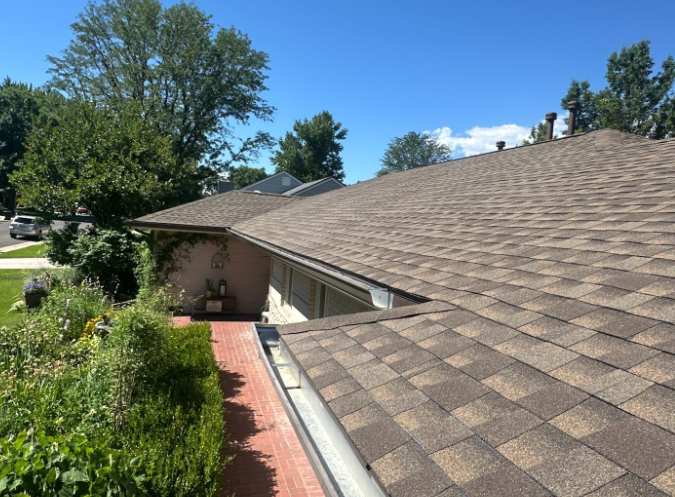Introduction
A new roof in Denver significantly enhances a home’s energy efficiency, a crucial aspect for homeowners looking to reduce energy bills and environmental impact. In this comprehensive guide, At Tried and True Roofing we explore how modern roofing solutions contribute to energy efficiency, from insulation improvements to the benefits of advanced roofing materials.
The Role of Insulation in Energy Efficiency
Insulation plays a pivotal role in maintaining a home’s temperature. A well-insulated roof prevents heat loss during winter and keeps the home cool in summer. Modern roofing systems come with advanced insulation materials that provide superior thermal resistance compared to older roofing structures. This enhanced insulation capability is essential for reducing the reliance on heating and cooling systems, thereby lowering energy consumption.
Advanced Insulation Materials
Today’s roofing options include materials such as spray foam insulation, reflective coatings, and multi-layered systems. These materials not only improve energy efficiency but also enhance the roof’s durability and lifespan. By opting for these advanced materials, homeowners can achieve significant energy savings over time.
Reflective Roofing Materials
Reflective Denver roofing materials are designed to reflect more sunlight and absorb less heat than traditional roofing. This technology is especially beneficial in regions with high temperatures, as it helps maintain a cooler indoor environment. Reflective materials reduce the heat island effect, a phenomenon where urban areas experience higher temperatures than their rural counterparts.
Benefits of Reflective Roofing
Reflective roofing materials, such as cool roofs, come in various forms, including reflective shingles, tiles, and coatings. These materials can lower roof surface temperatures by up to 50°F, thereby reducing the amount of heat transferred into the building. The reduction in cooling load translates to lower energy bills and increased comfort for the occupants.
Ventilation: Enhancing Airflow and Efficiency
Proper ventilation is crucial for maintaining a roof’s energy efficiency. Ventilation systems work by allowing air to circulate through the attic, which helps regulate temperature and moisture levels. An effective ventilation system prevents heat buildup in the attic during summer and reduces moisture accumulation during winter, which can lead to mold growth and structural damage.
Types of Ventilation Systems
There are various types of ventilation systems available, including ridge vents, soffit vents, and gable vents. Each system has its advantages, and the choice depends on the specific needs of the home. Ridge vents, for example, are installed along the roof’s peak and provide continuous airflow, while soffit vents are placed under the eaves to allow air intake.
Energy-Efficient Roofing Materials
The choice of roofing materials significantly impacts a home’s energy efficiency. Materials such as metal, clay tiles, and asphalt shingles offer varying levels of thermal performance. Metal roofs, for instance, are known for their durability and high reflectivity, making them an excellent choice for energy-conscious homeowners.
Metal Roofing: A Sustainable Choice
Metal roofing is one of the most energy-efficient options available. It reflects solar radiation, which helps reduce cooling costs during hot weather. Additionally, metal roofs are often made from recycled materials and are fully recyclable at the end of their lifespan, making them an environmentally friendly choice.
Asphalt Shingles: Cost-Effective and Efficient
Asphalt shingles are a popular choice due to their cost-effectiveness and ease of installation. Modern asphalt shingles come with reflective granules that improve their energy efficiency. These shingles can be combined with advanced underlayment materials to enhance insulation and reduce heat transfer.
The Impact of a New Roof on Heating and Cooling Costs
Investing in a new roof can lead to substantial savings on heating and cooling costs. Improved insulation, reflective materials, and effective ventilation all contribute to a more energy-efficient home. Homeowners can expect to see a reduction in their energy bills, which can offset the initial cost of the new roof over time.
Calculating Energy Savings
The energy savings achieved by installing a new roof depend on several factors, including the home’s location, the type of roofing materials used, and the quality of installation. On average, homeowners can expect to save between 10% to 20% on their energy bills by upgrading to an energy-efficient roof. This translates to hundreds of dollars in savings each year.
Conclusion
A new roof is a significant investment that offers substantial benefits in terms of energy efficiency. By choosing advanced insulation materials, reflective roofing options, and effective ventilation systems, homeowners can enhance their home’s comfort and reduce energy costs. Tried and True Roofing is committed to providing high-quality roofing solutions that meet the needs of homeowners looking to improve their energy efficiency. Whether you’re considering a new roof or looking to upgrade your existing one, our team of experts is here to help you make an informed decision.
In summary, investing in a new roof is a smart choice for homeowners aiming to enhance their energy efficiency. With the right materials and professional installation, a new roof can significantly reduce heating and cooling costs, contributing to a more sustainable and comfortable home. Trust Tried and True Roofing for your next roofing Denver project and experience the benefits of a more energy-efficient home.


